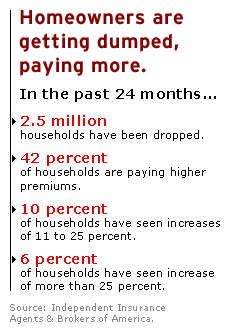Bend, Ore. (CNN/Money) -
Insurers are scrutinizing homeowners like never before.
They're charging higher premiums to homeowners with less-than-perfect credit. They're dropping customers who either file too many claims or, in some cases, even inquire about a possible claim.
And in some parts of the country, homeowners have been hit with higher rates and "non-renewals" for no reason other than location.
How bad is it?
A study by the Independent Insurance Agents & Brokers of America (IIABA) found that 51 million homeowners are paying higher premiums than they did two years ago. Of that group, 23 percent pay 11 to 25 percent more, while 13.8 percent have seen their rates increase by more than 25 percent.
"The numbers are quite staggering," said Robert Rusbuldt, CEO of the IIABA.
The implications are huge for homebuyers. "We are concerned that increased costs will affect people's ability to get into the market," said Marcia Salkin, who is part of an insurance task force created by the National Association of Realtors specifically to address problems with homeowners' insurance.
"We're seeing people who think they have insurance and then after they close on their house find out that the company won't give them insurance after all."
Insurers say it's nothing personal, just business
Insurance companies don't deny that they're raising prices and choosing their customers more carefully than they used to. But it's not because they're suddenly greedy, they say.

Rather, escalating repair costs and the increase in mold-related claims (especially in warm, wet climates) have made it more expensive for them to do business. At the same time, they say, homeowners' premiums had been artificially low.
"For years homeowners' insurance was heavily subsidized by (insurers') investments in the stock market," said Rusbuldt. "Then insurers woke up a few years ago and realized they'd have to actually start making money on the products they sell."
According to Don Griffin of the National Association of Independent Insurers, which is the largest trade association for the property and casualty insurance industry, insurers have been paying out more in claims than they've collected in premiums.
In 2000 insurers paid out $1.11 in claims for every $1 they collected in premiums, said Griffin, and in 2001 they paid out $1.16 in claims for every $1 collected. "At that point they had to raise premiums and go back and re-examine all of their policy holders because they can't afford to pay out more than they collect," he said.
But Griffin believes that relief is in sight.
Now that companies have made necessary adjustments, they'll be able to take on new customers and slow price increases. "I think over the next year, barring any major catastrophes, you'll see companies start easing their prices and taking on business they turned down in the recent past."
What you can do in the mean time
Doug Heller, a senior consumer advocate for the Foundation for Taxpayer & Consumer Rights, a nonpartisan organization in California, isn't that convinced that the problems with homeowners' insurance will go away any time soon.
"Law makers around the country heard plenty from constituents about this problem, but insurance rates continue to increase," he said, explaining that in California consumer groups and the insurance commissioner have pushed for reform, but so far with no luck. "Companies have simply said we are not going to sell insurance in this state if you impose this protection."
| More on your home
|

|
|
|
|
For now, there are some steps you can take to protect yourself.
There's still some value in shopping around. Although insurers are increasingly looking at past claims and credit reports, some are more willing than others to take on certain risks, while others give less weight to credit history.
Before you start shopping for insurance, check your credit report, as well as your C.L.U.E. report, which shows your history of insurance claims.
New homebuyers should ask sellers for a copy of their C.L.U.E. report because insurers now consider what claims have been made on a property when calculating your premium, even if you didn't own the home at the time.
In order to keep your premiums as low as possible, find out whether you'll qualify for discounts through your employer, alumni group or other affiliation. Also, you may get a break if you buy your homeowners' insurance and auto insurance from the same company.
Finally, if you raise your deductible from, say, $500 to $1000, for example, you could reduce your premiums by as much as 25 percent. By setting your deductible high and paying for small losses on your own, you'll have a better shot at keeping your premiums low.
Of course, there's a fine line between protecting yourself and letting yourself be bullied by insurers. You should not have to hold back on legitimate complaints because you're scared of losing coverage, said Heller.
The best protection will come with reform, he said. To that end, he recommends that consumers continue to complain to their state legislatures and insurance commissioners.
"I think insurance companies are finally started to take a second look at their practices," said Rusbuldt. "We might be turning a corner now, but we're not out of the woods by any stretch of the imagination."

|

